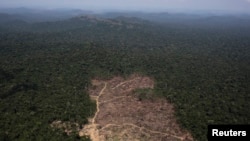Brazil has pledged to restore an area of degraded land larger than Romania by planting trees and introducing farming methods kinder to the environment - the biggest commitment of its kind ever made by a single country, according to advocacy groups.
South America's largest nation will restore 12 million hectares of destroyed forests by 2030 through planting trees and promoting natural growth, said Jose Sarney Filho, Brazil's environment minister.
"We will reforest, restore forests and promote regeneration," Filho told delegates at a U.N. biological diversity conference in Cancun, Mexico which opened at the weekend.
Brazil will also restore five million hectares of degraded pasture land by 2020, and it will launch a low-carbon farming plan to improve another five million hectares of land by 2030.
Much of the land was initially degraded due to deforestation to make way for cattle grazing or farm plantations, said Miguel Calmon, a landscape restoration expert with the International Union for Conservation of Nature.
The growth of cities, illegal logging and speculation - where investors cut down trees with the hope of claiming state land and then reselling it - also contributed to the problem, he said.
"Degraded lands don't do any good for anyone," Calmon told the Thomson Reuters Foundation on Monday. "We will create lands where farmers, society and the planet can benefit."
Much of Brazil's degraded land is privately owned, Calmon said. Part of the restoration plan involves providing loans and grants to farmers to plant more trees and make other changes to how they work the territory.
Financing for land restoration pledges will come from international donors through climate change adaptation pledges, the private sector, Brazil's government and aid groups, Calmon said.
Restoring the initial 12 million hectares of forest is expected to cost about $10 billion, Calmon said, citing Brazilian research.
Rachel Biderman, Brazil director for the World Resources Institute, a research group, said the restoration plan would save money in the long-term.
Brazilians will benefit from new jobs and increased economic growth under the plan because "restoration brings vitality back to under-performing landscapes", Biderman said in a statement.





